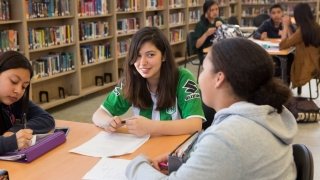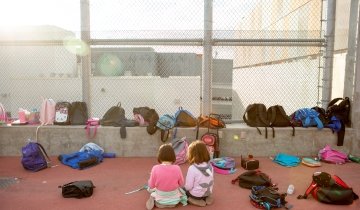As 2024 comes to a close, USC Rossier reflects on a year marked by groundbreaking research, leadership in education and continued innovation in the face of societal challenges. From exploring the future of AI in education to celebrating faculty achievements and fostering equity in K–12 schools, 2024 has been a year of progress and resilience.
AI in education: Potentials and pitfalls
Kicking off the year, the USC Rossier Magazine’s Fall/Winter issue delved into “Education in the Age of AI,” examining both the opportunities and challenges artificial intelligence brings to higher education. Featured stories highlighted the evolving role of AI in college admissions, its potential to level the playing field in test preparation and the need to balance its benefits with potential risks. AI’s place in education quickly became one of the year’s top topics.
Resilience in the face of tragedy
In February, USC Rossier spotlighted the unwavering compassion of Maui Prep’s community in the wake of the Lahaina fire. Despite the devastation, students, faculty and staff demonstrated remarkable resilience and a shared commitment to education. That same month, Professor Adrianna Kezar and alum Jordan Harper discussed their new book on leadership in higher education, offering insights on the evolving role of leaders in navigating the challenges facing academic institutions today.
Pioneering research and leadership
March saw the release of a landmark study on “transcendent” thinking, revealing how this form of cognitive engagement may play a significant role in promoting the healthy development of adolescent brains over time. Several faculty were recognized and celebrated for career milestones. As researchers and educators, their contributions and dedication to the field are invaluable in shaping education policies, promoting equity and improving learning environments. The Center for Enrollment Research, Policy and Practice Conference 2024: Defending Equity discussed pathways to continue promoting an equitable admissions process and responded to the onslaught of attacks against diversity, equity and inclusion (DEI).
A focus on justice and ethics
April brought significant attention to criminal justice research, as USC Rossier researchers secured a $1M grant to further their work in prevention strategies. In the same month, a Hippocratic Oath for teachers offered ethical standards and a commitment to students. April also featured discussions on the increased focus on DEI, with experts noting that “It is open season for DEI” at the 45th Pullias Lecture examining the current environment in higher education.
Breaking barriers in education
As the spring semester concluded, May highlighted the stories of individuals breaking free from societal norms. USC Rossier’s Class of 2024 was encouraged to continue their fight for individuality and change in the world. In addition, USC Rossier’s EdTech Accelerator program led the charge of integrating AI into educational tools, showcasing the exciting future of technology in the classroom.
In June, USC Rossier faculty shared their top summer reading recommendations, offering the community a chance to reflect and engage with new educational ideas. USC College Advising Corps (USC CAC) advisers celebrated Decision Day with Cabrillo High School students in Long Beach with near-peer advisers who met with students to unlock their college potential. Meanwhile, a first-generation EdD in Educational Leadership graduate called for better representation in higher education, an issue that would continue to resonate in the months ahead.
July brought new developments in online education with the launch of USC Rossier’s Master of Science in Marriage and Family Therapy program. Researchers also continued to examine the effects of trauma on teen brains, with new findings suggesting that transcendent thinking could help mitigate the negative impact of violence exposure. The power of this thinking also emerged as a key tool in helping teens find purpose in a challenging world.
Honoring research and achievements
In August, USC Rossier Associate Professor Yasemin Copur-Gencturk secured a $6.7 million federal grant to improve math education for elementary school students—a step forward in ensuring that teachers have the resources they need to succeed. Professor Jessica DeCuir-Gunby was named president of the American Psychological Association’s Educational Psychology Division. A new study from the USC EdPolicy Hub sheds light on the adolescent mental health crisis in the United States emphasizing the interconnectedness of mental health, attendance and school grades.
In September, USC Rossier’s EdTech Accelerator program opened its application portal for the next cohort, promising further innovation in educational technology. A new tool aimed at supporting educators also caught attention, reflecting ongoing efforts to address the mental health challenges within the teaching profession. In addition, USC Center for Affective Neuroscience, Development, Learning and Education (CANDLE) researchers explored a new kind of developmental science in education in an autobiographical film production program for high school students. In addition, research from Professor Brendesha Tynes examined how teacher expectations of Black students in the classroom affected student experiences in a 1:1 technology program.
Diversity, equity and innovation
October highlighted the personal stories of educators and students who embrace their diagnoses as “superpowers,” challenging societal stereotypes and overcoming adversity. Meanwhile, USC Rossier’s Shaun Harper and Royel Johnson were named Diversity, Equity, Inclusion & Accessibility Visionaries by the Los Angeles Times, underscoring the school’s commitment to promoting DEI in higher education. In addition, USC Rossier Educational Counseling program unveiled modernized coursework to reflect the ever-changing landscape in higher education.
November marked several significant developments. USC Rossier welcomed the Edtech Accelerator’s seventh cohort. In another highlight, the success story of a district’s remarkable rise was shared, showcasing how strategic initiatives and leadership have turned challenges into opportunities for growth. Additionally, an innovative partnership was announced aimed at enhancing equity in K–12 math education, with the goal of ensuring that all students, regardless of background, have access to high-quality learning experiences. These stories showcase USC Rossier’s continued focus on equity, innovation and collaboration in the educational landscape.
In December, the USC Rossier Magazine 2024 Fall/Winter issue asked “Are schools of education still necessary?” The latest issue presented USC Rossier’s response through a showcase of the impactful work and research conducted by our alumni, students, staff and faculty.
Looking ahead to 2025
As USC Rossier reflects on a year of transformative stories, the community looks ahead to 2025 with a renewed commitment to fostering educational innovation, social justice and inclusion. With continued advancements in research, leadership and technology, USC Rossier remains a driving force in shaping the future of education.







